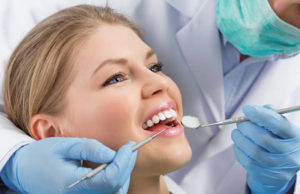Making The Most Of Our Hygienist Services In Canterbury
How our Canterbury patients benefit from regular oral hygiene visits
 For most people, a trip to the dentist twice a year for a checkup, combined with brushing their teeth at home, is the extent of their oral health care regime.
For most people, a trip to the dentist twice a year for a checkup, combined with brushing their teeth at home, is the extent of their oral health care regime.
This is a very good start for sure, but if you follow this regime alone, you are missing out on a great opportunity to have a really healthy mouth.
At Bradley and Partners Dental and Implant Clinic, we are firm believers in preventative dental care and one of the best ways to achieve this is by seeing the hygienist on a six monthly basis.
This is an inexpensive and effective way of preventing many common dental problems and helping patients change the way that they look after their teeth and gums for the better.
What does a dental hygienist do?
The role of the dental hygienist is mainly twofold. They have a physical role to play in keeping your teeth and gums clean through a procedure called a ‘scale and polish’ but they also play an educational role which enables patients to look after their teeth and oral health in general.
The scale and polish procedure
When we brush and floss our teeth well, we remove much of the residual food debris and bacteria that can lead to problems like decay and gum disease. It is almost inevitable though, that however well we clean them, some will remain attached to the teeth and gum line, especially in those areas that can be difficult to clean ourselves.
These bacteria will form a hard ‘crust’ on our teeth and gums that can only be removed by the hygienist. If you run your tongue over your teeth and they feel rough, this is very likely to be this hardened bacteria and mineral deposit which we call ‘tartar’. This rough surface then attracts more bacteria as the roughness of the surface makes it easier to stick to. Over time, tartar will damage teeth and gums if not removed.
The scale and polish procedure comes in three parts….
Initial descaling – The procedure doesn’t require a local anaesthetic as it is painless. This is probably the part that patients like least though as it involves the use of a sharp implement to remove the largest part of the tartar from between our teeth. This can lead to a ‘pulling’ sensation, but it doesn’t cause any pain.
Sonic cleaning – Following this, a sonic tool is used which shatters most of the remaining tartar and allows it to be washed away with water. This leaves your teeth much cleaner and will also remove some surface staining from the teeth as well. Any remaining tartar and further enamel staining is then removed with a final brushing.
Brushing and polishing – In many ways, this is similar to an electric toothbrush like many people use at home. It is much faster and more effective though and will help to clean and polish your teeth and leave your mouth in a much cleaner condition.
Educational role
A probably less publicised but equally important service provided by the hygienist is their educational role. Having healthy teeth and gums means that preventative care must be taken and following the advice of a hygienist will play a big part in this.
To help you improve your oral health, they may discuss, amongst other things:
Flossing – Do you use dental floss? Most people don’t, but it is the best way to clean in the spaces between your teeth. The hygienist will not only encourage you to do this, but demonstrate how, should you wish.
Lifestyle – Some lifestyle choices, predominantly smoking and alcohol are well known to be harmful for oral health. Not only do they increase the risk of gum disease, but oral cancers too.
Diet – People have different diets, with some being high in sugar whilst others may have chosen restrictive diets which could cause a deficiency in certain important minerals. We are happy to discuss this with you.
Medications and illnesses – Some of our patients will be on medication or receiving medical treatment. Some of these may, as a side effect, cause dental problems. We will discuss these and ways that you can improve your oral health at this time. Where the harm is significant, we may suggest that you discuss the possibility of a change in medication with your GP. Under no circumstances should you stop taking or changing any medication without discussing it with your GP first.
Toothpastes and mouthwashes – There are so many different types of toothpaste advertised these days that it can be confusing as to which one to buy. The final choice is yours of course, but we are happy to offer our advice on this matter.
If you already see a dentist at Bradley and Partners Dental and Implant Clinic, why not see the hygienist too? Regular six monthly appointments can make a real difference to your oral health.
Please call our Canterbury dental clinic today on 01227 463529.
